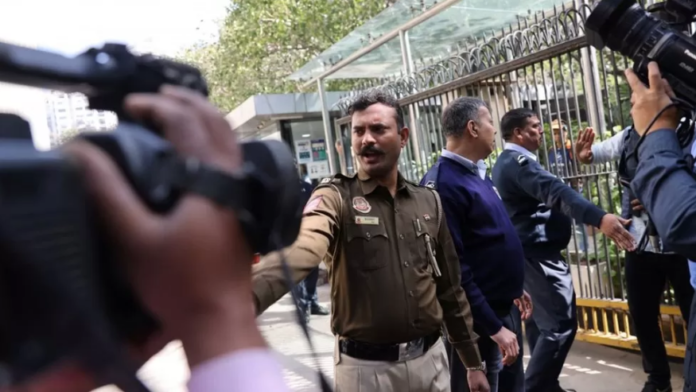Bureau Report
NEW DELHI: Indian tax officers searched the BBC’s bureaus in New Delhi and Mumbai on Tuesday, the British broadcaster said, weeks after the government came down hard against a BBC documentary critical of Prime Minister Narendra Modi’s role in the 2002 Gujarat riots.
The documentary had focused on the Hindu nationalist politician’s leadership as chief minister of the western state during the deadly communal riots, in which at least 1,000 people were killed, most of them Muslims, though activists put the toll at over twice that number.
“The Income Tax Authorities are currently at the BBC offices in New Delhi and Mumbai and we are fully cooperating. We hope to have this situation resolved as soon as possible,” the BBC said in a statement.
The tax department did not respond immediately to emails seeking comment.
One of two sources in the BBC’s New Delhi office told Reuters that tax officials were speaking with the accounts officer and no one was allowed to leave.
While the search was underway, television news crews set up outside the office near Connaught Place, in central Delhi, to report developments.
The Editors Guild of India, which calls itself a non-partisan association of editorial leaders, said it was deeply concerned by the visits by the tax officers.
“It is distressed by the continuing trend of government agencies being used to intimidate and harass news organisations that are critical of the ruling establishment,” it said in a statement.
It said the department similarly searched the offices of the media outlets NewsClick, Newslaundry, Dainik Bhaskar and Bharat Samachar in 2021 following their “critical coverage of the government establishment”.
Modi’s Bharatiya Janata Party (BJP) said Indian institutions work independently and the tax department was “within law in looking into tax compliance”.
“India is a vibrant democracy where no one is above the law,” Gopal Krishna Agarwal, a BJP spokesman, said.
The main opposition Congress party condemned the tax department’s actions.
“The IT raid at BBC’s offices reeks of desperation and shows that the Modi government is scared of criticism,” lawmaker and Congress General Secretary K C Venugopal wrote on Twitter. “We condemn these intimidation tactics in the harshest terms. This undemocratic and dictatorial attitude cannot go on any longer.”
The government has dismissed the BBC documentary as propaganda. The foreign ministry in January said it was meant to push a “discredited narrative”, was biased, lacked objectivity and showed a “continuing colonial mindset”. The BBC has stood by its reporting for the documentary.
Last month, police in Delhi detained students as they gathered to watch the documentary that the government has dismissed as propaganda. India’s foreign ministry in January said the documentary was meant to push a “discredited narrative”, was biased, lacked objectivity and showed a “continuing colonial mindset”. The BBC has stood by its reporting for the documentary.
Modi ruled Gujarat for more than a decade before becoming prime minister in 2014. Accusations he did not do enough to stop the rioting have dogged his career. Modi has always denied any wrongdoing. In 2013, a panel appointed by the Supreme Court said there was insufficient evidence to prosecute him.
A suspected Muslim mob set fire to a train carrying Hindu pilgrims in Gujarat in February 2002, setting off one of independent India’s worst outbreaks of communal violence.




